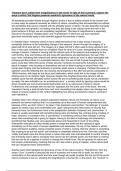‘Humans don’t realise their insignificance in the world’ In light of this comment, explore the
ways in which Ted Hughes presents mankind’s ignorance of the natural world.
An extremely prevalent theme through Hughes’ poetry is that of dislike towards to the human kind.
In many ways he presents humanity as inferior to nature, something that will essentially be outlived
and something that cannot compete with the almighty power of nature. He also describes humanity
as destructive and ignorant, not seeing what they are doing to the natural world and how in the
grand scheme of things, we are completely insignificant. This idea of insignificance is especially
relevant in the poems ‘October Dawn’ and ‘That Moment’ in which we see how mankind’s
ignorance eventually leads to their downfall against the enormity of nature.
In ‘October Dawn’ humanity seems to have lulled themselves into a false sense of security,
completely oblivious to the foreboding change of the seasons, shown through the imagery of ‘a
glass half full of wine left out’. The imagery of a ‘glass half full’ if often used to show optimism and
how, in this case, humanity have an unrealistic hope for what is to come, disregarding the coming
change of season. Instead of moving with the natural cycle of the seasons and preparing for the
cold months, they are frivolous and are living with abundance and plentifulness, the use of the
noun ‘wine’ indicating their relaxed and almost celebratory nature as ‘wine’ is often associated with
richness and the product of a successful harvest. Also, the use of half rhymes throughout this
poem could also reflect this sense of false security; humanity not seeing the full picture of what is
about to happen, only focusing on themselves and not on what is going on around them, this
human part clinging onto the familiarity of summer whilst nature is changing. Perhaps this sense of
optimism could be reflecting the new security and prosperity of the after-war period, particularly in
1950s America, with hope for the future and celebration, which could link to the image of them
drinking wine on an October night. However despite this, Hughes shows that nature is still an
endless cycle that will ultimately outlive human life and is something that should not be overlooked
so easily. He saw civilisation as ‘an evolutionary error’, a society which by ignoring nature would be
driven towards war and environmental destruction due to our ignorance of what is natural.
Furthermore, this contrasts with the last line ‘squeezes the fire at the core of the heart’, the verb
‘squeezes’ having a quite forceful tone and ‘core’ presenting how deeply nature can damage and
impact a humans outlook on life, further highlighting how strong and powerful nature’s command
over mankind is.
‘October Dawn’ also shows a distinct separation between nature and humanity, as nature is so
powerful and almost mythical that it is completely out of the reach of human comprehension and
because of this, we don't notice it. ‘by dawn / Has dreamed a premonition’, the lethargic ‘d’ sounds
appear to create a lazy and comfortable tone, again referencing this false sense of security that
humanity have, but furthermore there is the juxtaposition between ‘dreamed’ and ‘premonition’. A
dream is usually associated with something being calm and fantasy like, perhaps bring a feeling of
hope. However, in contrast to this, a ‘premonition’ is something ominous that indicates a strong
sense that something bad is going to happen, linking to the idea of mythology and shamanism,
something that Hughes was very passionate about and frequented in much of his writing.
Shamanism indicates an other-worldly power to shape the world and the mythical is again
something out of the reach of human capabilities and awareness. On top of this, Nature is almost
given omniscient qualities, being constantly aware of what is coming, that this ‘dream’ is something
that is going to be put into action, yet humanity is completely oblivious to this. One critic said that
‘vitality and death were the divine forces in nature that early man had attempted to control’ showing
that humanity wasn’t able to recognise that nature has the ultimate power and that there is nothing
that we can do as a species to control or change this infinite force. We are ignorant of nature and
lack proper understanding, meaning that we can’t see what is going to happen, unlike nature itself
that can recognise these ‘premonitions’.
Another poem that highlights the ignorance of man of the natural world is ‘That Moment’ from the
series ‘Crow’. It seems to describe the end of humanity and human life on earth, but also the
continuation of the natural world and how even though we would consider this the end of the world,
nature continues to live on, showing the insignificance of human life. In this poem, the ‘moment’ is




